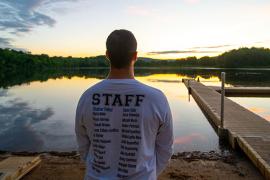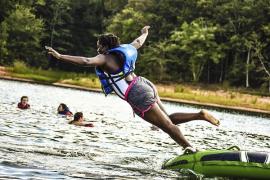As we emerge from the aftermath of the pandemic, a resounding echo of change reverberates through the hearts of those who lead summer camps across the nation. The days of conventional, one-size-fits-all staff training are but fading embers. Today, staffing demands require a level of flexibility akin to Cirque du Soleil performers, and how staff learn and practice for their job is a drastically different spectacle.
In this season of reflection and planning for the summer ahead, the question is raised: How will you tailor your training approach to ensure that staff are well-trained and equipped for the diverse challenges they’ll face?
Harness the Upside of Online Learning
Online learning, often met with apprehension, may be the key to unlocking vast possibilities for building your staff’s knowledge and skills. Reservations do exist – we’re an industry built on human connection, after all. Yet, consider this: How do you bridge the gaps when your staff members trickle in at various times over your training period or miss it completely?
Think of this as more self-guided learning. Harness the power of online content — curated by camp leaders or sourced from expert creators. Imagine your staff accessing recordings of training sessions, bite-sized micro-videos, immersive readings on policies and procedures, enlightening tutorials on complex processes, audio files or podcasts, and engaging online quizzes followed by self-study guides.
Don’t underestimate the allure of online learning. Staff engagement isn’t exclusive to physical presence. It’s about creating pathways for them to demonstrate capacity and prove their competence. Think through the topics that are well-suited for online learning. What training happens now that is passive learning or typically delivered via one-way communication? These topics can be covered or planned for make-up via online learning.
Maximize the Opportunities for On-Site Training
Time on-site is sacred, and your mission is clear: Make every moment count. The learning must be engaging and active, including increased collaboration time, simulations and drills, emergency rehearsals, skill development, time to test knowledge, practice real scenarios, meaningful debriefs, and culture building. Training time on-site should be less passive and limit the amount of one-way communication content.
Rehearsal isn’t just an option; its core to the learning experience. It’s how knowledge is etched in the souls of your staff. It’s the difference between competence and mediocrity. But rehearsing is hard to replicate for those who miss it. So, design pathways to ensure every staff member gains this valuable insight:
- Offer one-on-one or small group make-up training sessions, empowering senior staff to share their wisdom (and practice their training skills simultaneously).
- Customize learning paths based on individual skills and experience.
- Pair inexperienced staff with seasoned staff — let them shadow and learn by doing.
Training Should Be Ongoing All Summer Long
As a lifelong learner, you understand the relentless pursuit of knowledge. Yet, in the whirlwind of camp life, it’s easy to forget the importance of continuity. Training isn’t a one-time event; it’s an epic saga that unfolds throughout the summer.
If you look at our aquatic programs, they are likely to have the most robust culture of practicing skills throughout the summer. But you can’t stop here. The same principles must expand to other vital areas of your camp — the ropes course, behavior management, abuse prevention and driving safety, to name a few. Staff must continue to hone their skills and diversify their knowledge, especially for the content or skills they haven’t used as frequently. Access to reference materials is their compass in this ongoing learning journey. Camps are meeting this challenge through customized apps that offer instant wisdom and reference at their fingertips.
Don’t wait until the end of summer to determine if training worked. Conduct surveys and listen to your staff’s wishes and struggles. Observe, analyze, and offer short, precise training when needed. It’s essential also to have a plan for anyone who may lack the competencies required for their position. Plan how they will be removed until they gain the critical competencies.
Keep Your Training On-Point
Training must be deliberate, on-point, and aligned with the camp goals and objectives. This is your guardian against risk and safety mishaps.
Remember the saying, “If you didn’t document it, it didn’t happen”? It applies to training, too. Keep meticulous records, whether on paper or in the digital realm. Capture every certification, every skill verification, every topic covered in pre-camp, every skill or training updated, and every milestone in job experience gained. This is a critical step of record keeping that is too often overlooked. If you’re struggling to find ways to track and organize this information, reach out to others on ACA Connect — there are hundreds of genius strategies for this happening at camps now.
As you navigate the ever-evolving landscape of summer camp training, we must blend all our tools and resources to find your path forward. By embracing these principles and adapting them to the unique needs of your camp, you can find a future where every staff member is well-prepared, confident and capable of meeting the challenges and opportunities of their roles. In doing so, you safeguard the traditions and values of your camp and propel it toward even greater excellence.
References
- Chapelle, A. (2023). Smaller companies must embrace risk management. Harvard Business Review.
- Eduarado Salas, S. I.-J. (2012). The science of training and development in organizations: what matters in practice. Psychological Science in the Public Interest, 74-101.
- K. Anders Ericsson, M. J. (2007). The making of an expert. Harvard Business Review.
About the Author

Tori Barnes-Adams has 25 years of directing day and resident camp and youth development programs with focused work on leadership and learning development, risk and crisis management, and LGBTQ+ issues. She works in the insurance industry as a risk consultant focusing on the camp, sports, and outdoor recreation market. As the former assistant director of accreditation with the American Camp Association, she is a strong advocate for health, safety, and youth protection in camps and served on ACA’s Crisis Hotline Team. She resides in California.
To stay on top of what is happening in today's evolving world and explore up-to-date information on pressing issues facing camps, visit blog.churchmutual.com/camps.
Periodically, the American Camp Association (ACA) makes timely and relevant information about products and services available to its members so they can make informed decisions for their camps. However, the ACA does not endorse products, services, or companies.




